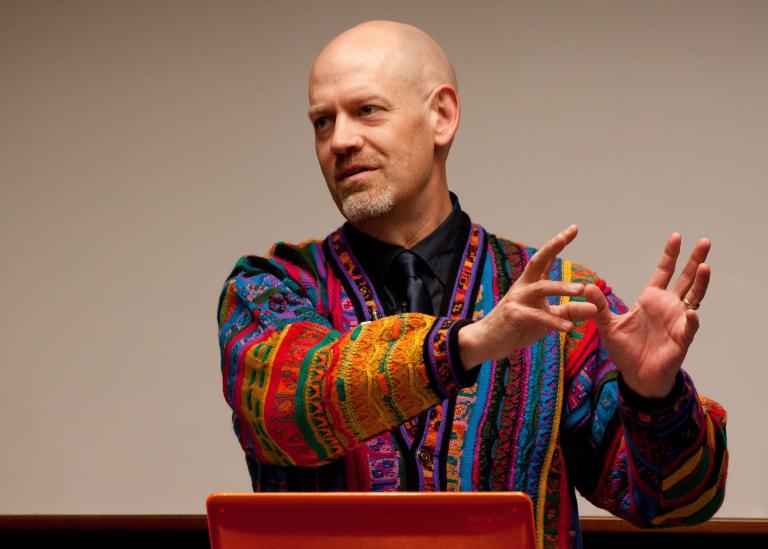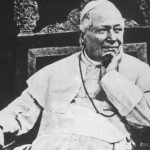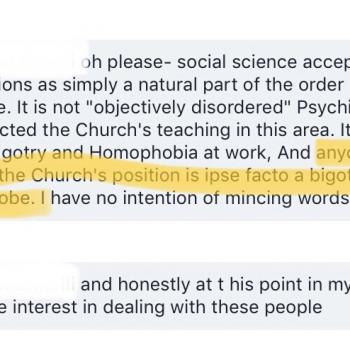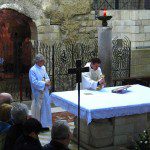
On the Dividing Line of April 2, Dr.* James White of Alpha & Omega Sophistries had an attack of the hysterics over a Casting Crowns song entitled “Jesus Friend of Sinners.” (The wild extent of it must be heard to be believed; the audio begins a little over half way through the program and continues through to the end.) Here, for your sincere listening pleasure, is the song that provoked Dr.* White into bitter jeremiads against the compromised state of contemporary Christian lyrics.
The lyrics—read exegetically, without any eisegesis on the part of the commenter—seem to me nothing more than a plea against the hypocritical judgment of others (Matt. 7:1), as well as against putting a stumbling block in your brother’s way (Rom. 4:13). In the song, the stumbling block is oneself. “They’re tripping over me,” is how Casting Crowns puts it. For Dr.* White, however, “Jesus Friend of Sinners” advocates complacency in the face of sin. It reflects a reluctance to call out sin for what it is.
On the contrary. In fact, the song calls out several sins: judgmentalism, hypocrisy, being double-minded, having a hardened heart. It’s directed at the Pharisees among us, for they are out there. But somehow Dr.* White insisted on going down the rabbit trail and using homosexuality as an example of a sin that needs to be called out—despite the fact that the song doesn’t mention that particular sin one way or the other.
More peculiarly, though, Dr.* White called attention to the fact that he, Dr.* White, has often been unfairly criticized for “cutting down people in [Christ’s] Name”—Roman Catholics, for example, among them—when actually all he, Dr.* White, is concerned to do is to defend the truth of the Gospel. It is remarks like this that make me wonder whether his having taken 30 minutes of his time to lambast “Jesus Friend of Sinners” has more to do with some sensitivity of his own on this point, rather than anything the lyrics of the song actually say. It is difficult to miss the eisegesis engaged in here by Dr.* White.
Be that as it may, what surprised me most was the pains Dr.* White took—in an attempt to prove that he is not unfriendly to all contemporary Christian music—to praise a Steve Green song from several decades back, entitled “Find Us Faithful.” He even took the trouble to put up a separate blog post embedded with two—two!—YouTube videos of the song. What’s surprising about this is that I would have suspected Mr. Green’s song to have raised the ire of Dr.* White far more than “Jesus Friend of Sinners.” What do I mean? Well, take a listen to the song, and you’ll discover that “Find Us Faithful” is not much better than a sell-out to Romanism.
Mr. Green begins with an allusion to the “narrow way” of Matthew 7:14, and then declares that “those who’ve gone before us line the way.” Now, isn’t this talking about the Communion of Saints? And please tell me where, in Scripture, it says that the “narrow way” is lined by the dead? Mr. Green is evidently relying on some extra-biblical tradition here—and a pretty grotesque one, at that. Just picture a narrow way lined with the bodies of the dead. That’s the kind of horrific image that one would expect of a Romanist, not an evangelical Christian.
It doesn’t get any better, either, because Mr. Green goes on to describe these dead saints as “cheering on the faithful” and “encouraging the weary.” Does Mr. Green really mean to suggest that the elect in Heaven have any clue what’s going on here on Earth? Obviously, one of Rome’s defenders would say so. But why does Mr. Green make such an unbiblical assertion? Does he really believe that the saints in Heaven are actually emotionally invested in our lives? That they might even—just imagine!—pray for us?
The lives of the saints, Mr. Green says at the conclusion of his first verse, are “a stirring testament” to the grace of God. But there are only two testaments—the Old and the New. How is it that Mr. Green feels that he can add the “testament” of saints’ lives to the canon of Scripture?
In his second verse, Mr. Green begins with some further biblical allusions (as if attempting to rescue himself from this Romanist predicament). He refers to the “cloud of witnesses” of Heb. 12:1, a verse that the papists often vainly claim in support of their heretical doctrine of the saints. Mr. Green also makes reference to the similar verses 1 Cor. 9:24 and Phil. 3:14—again, verses often cited by Rome’s defenders in support of the idea that justification is a process and not a once-for-all event. “As those who’ve gone before us,” Mr. Green sings, “Let us leave for those behind us / The heritage of faithfulness passed on through godly lives.” What should be troubling to any Reformed believer at this point is that there’s not been one word about the finished work of Christ in reference to faith. Instead, Mr. Green makes reference to the “godly lives” of the saints! One suspects a veiled reference to works in this.
But now we come to what is really the most troubling part of the song, and that’s the chorus, where Mr. Green expresses the desire to be found faithful. “May the fire of our devotion,” he sings, “light [the] way” of generations to come. This is most disappointing. Mr. Green says nothing about the fire of Christ’s righteousness. He says nothing about the finished work of Christ. And he continues in the same vein: “May the footprints that we leave / Lead them to believe.” It’s man’s works, man’s footprints, that are said to cause belief. Mr. Green says nothing about the Scriptures being a cause of belief. Mr. Green says nothing about the grace of God, which alone turns man’s heart of stone into a heart of flesh. This is all about works; this is all about what man can do. This is works righteousness. It’s Romanism. There’s all this talk in the chorus about “we,” “we,” “we”; nothing about Christ. This is a man-centered, false Gospel.
“Find Us Faithful,” when all is said and done, is straight out of Vatican II. It’s about man’s works; it’s about the Communion of Saints. It’s about the Universal Call to Holiness (see Lumen Gentium chapter 5 and John Paul II’s apostolic letter Novo Millennio Ineunte). Mr. Green’s lyrics are—to borrow an expression from Mr. Marycle (spelled thus in honor of Our Lady)—“verses of sheer awesomeness.” Truly, I think Dr.* White should go public with a severe condemnation of this song. To remain silent would be inconsistent with his prior critiques of Rome, and Dr.* White has always been known to be “a consistent child of the Reformation.”
***
If you like the content on this blog, your generous gift to the author helps to keep it active. I remember all my supporters in my Mass intentions each week.
















